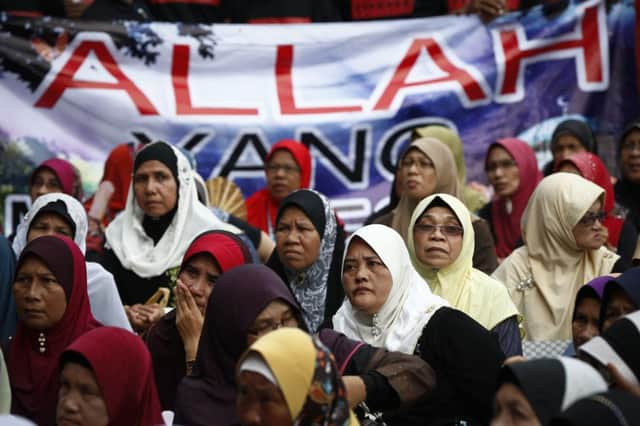Malaysia: Only Muslims can refer to God as ‘Allah’


In a 4-3 judgment, the Federal Court rejected a challenge by the Roman Catholic Church and upheld a government ban.
Most Christians in Malaysia worship in English, Tamil or Chinese dialects, and refer to God in those languages. But some Malay-speaking people on Borneo island have no other word for God but “Allah”, a Malay word derived from Arabic. The Church had argued that the ban failed to consider the rights of all minorities.
Advertisement
Hide AdAdvertisement
Hide AdThe lengthy court cases, which began in 2009, also raised the question whether the freedom of religion guaranteed by the country’s constitution is real.
The Rev Lawrence Andrew, editor of Catholic newspaper The Herald, which is at the centre of the controversy, said: “We are disappointed. The four judges who denied us the right to appeal did not touch on fundamental basic rights of minorities.
“It will confine the freedom of worship. We [Christians] are a minority in this country, and when our rights are curtailed, people feel it.”
The court ruled that the Church had no grounds to appeal against last year’s lower court decision, which banned the use of “Allah” in the Malay-language weekly. The Catholic Church may ask the court to review the decision, Mr Andrew said.
The government says “Allah” should be reserved exclusively for Muslims, who make up nearly two-thirds of the country’s 29 million people. If other religions use the term, that could confuse Muslims and lead them to convert away from Islam, it claims.
Christian leaders argue that the ban is unreasonable because Christians who speak the Malay language have long used the word in their Bibles, prayers and songs. Christians make up about 9 per cent of the population. The ban appears to apply mostly to published materials, not spoken words – newspapers using the term would lose their licence. Imported Malay-language Bibles containing the term have already been blocked.
However, it is not clear what the punishment would be for violating the ban.
Phil Robertson, a spokesman for Human Rights Watch, said: “This is a sad state of affairs that shows how far and fast religious tolerance is falling in Malaysia.
Advertisement
Hide AdAdvertisement
Hide Ad“The Malaysian government should be working to promote freedom of religion rather politically exploiting religious wedge issues.”
The controversy has provoked violence in Malaysia.
Anger over a lower court ruling against the ban in 2009 led to a string of arson attacks and vandalism at churches and other places of worship. A 2013 judgment by the Court of Appeals reversed that decision, prompting the Catholic church to ask the Federal Court to overturn it.
An umbrella group of Catholic, Protestant and Orthodox churches in Malaysia said Christians will continue to use the word “Allah” in their Bibles and worship, saying the court ruling was only confined to the specific Catholic newspaper.
The Rev Eu Hong Seng, chairman of the Christian Federation of Malaysia, said: “We maintain that the Christian community continues to have the right to use the word ‘Allah’ in our Bibles, church services and Christian gatherings.”
Defence minister Hishammuddin Hussein said: “This is an emotional issue that can affect the country’s [racial] harmony. We must handle it with wisdom. The court has made a decision, so let’s accept it.”
Some experts believe the issue is an attempt by prime minister Najib Razak’s ruling Malay party to strengthen its conservative Muslim voter base as government policies have made Islam and Malay identity inseparable.